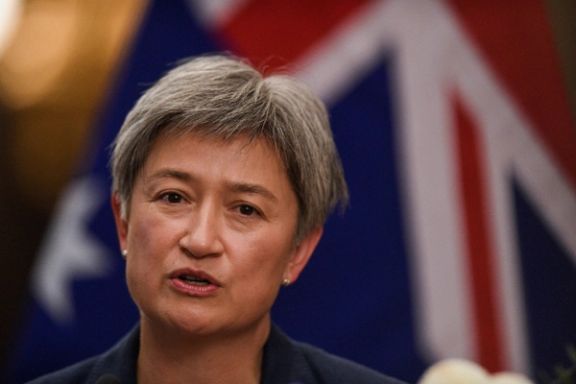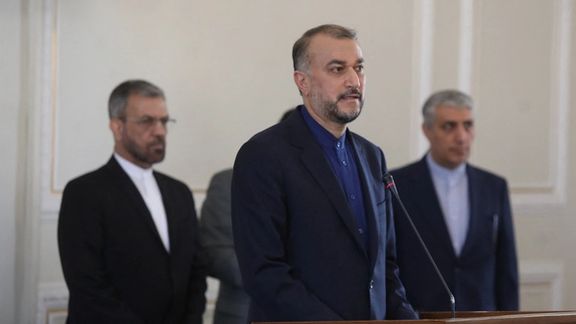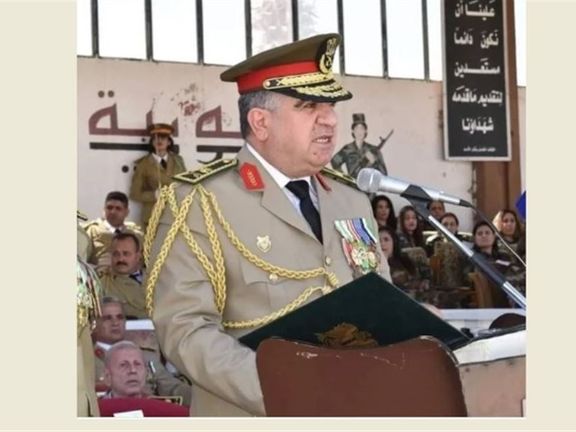Canberra Expresses Concern Over IRGC’s Harassment Of Australians

Australia has expressed deep concern over Iran’s "interference" in the country's affairs, including "in person and online harassment" of Australian citizens.

Australia has expressed deep concern over Iran’s "interference" in the country's affairs, including "in person and online harassment" of Australian citizens.
A spokeswoman for Foreign Minister Penny Wong told the ABC, “The Australian government is deeply concerned by reports of foreign interference, including the harassment and intimidation of Australians online and in-person".
"We have raised our concerns about foreign interference directly to the Iranian regime in no uncertain terms," said the spokesperson who did not want to reveal her identity.
"Australia will continue to work domestically to keep Australians safe from foreign interference and with our like-minded partners to apply pressure on the Iranian regime over its egregious human rights abuses."
She also noted that Australia has been integral to building pressure internationally and was at the forefront of efforts to remove Iran from the Commission for the Status of Women.
Based on a report tabled in parliament, ABC reported that Iranian Revolutionary Guard-affiliated elements have launched targeted cyber-attacks on Australian organizations, with the aim of using the data obtained for extortion.
“The IRGC-affiliated actors are actively targeting a broad range of entities, including entities across multiple US critical infrastructure sectors as well as Australian, Canadian, and United Kingdom organizations,” the report says.
The report suggests IRGC agents often operate under the auspices of Najee Technology Hooshmand Fater LLC, based in Karaj, Iran, and Afkar System Yazd Company, based in Yazd, Iran.

Iran’s Foreign Minister Hossein Amir-Abdollahian has said that the United States is in no position to even speak about human rights.
In a tweet on Tuesday, Amir-Abdollahian said as a result of Washington’s “interventionism” two million people have been “slaughtered” in Iraq, Afghanistan, Yemen and Syria, and the United States is also “enflaming the fire of the Ukrainian war”.
“Stop hypocrisy. The great nation of Iran knows well the malevolence behind nice-sounding words,” he added.
His comments come after US State Department Spokesman Ned Price said Monday that the US is united with its allies and partners in the need to confront Iran’s leadership for its human rights abuses and destabilizing activities.
Islamic Republic’s foreign minister claimed that the White House still insists to hold direct negotiations with Iran. “If there is a serious will on the other side, we believe an agreement would be attainable,” he said at a meeting at the foreign ministry.
Referring to anti-government protests, Amir-Abdollahian said Monday that the Americans realized earlier than the three European countries that nothing special has happened and will not happen in Iran.
The United States has openly stated that its “focus” now is on “the remarkable bravery and courage that the Iranian people are exhibiting through their peaceful demonstrations”, and the EU has come up with new sanctions on Tehran.
The unrest in Iran after the death of Mahsa Amini have garnered strong sympathy around the globe. At the same time Iran’s unwillingness to compromise on the nuclear issue persuaded the US to adopt a tougher position toward Tehran.

In a meeting with the Syrian defense minister, Iran’s President Ebrahim Raisi has said the Islamic Republic is ready to help Damascus financially in rebuilding the country.
Raisi also described the relations between the two countries as strategic stating that Iran will always stand by Syria.
“The Islamic Republic of Iran is a true friend of the Syrian nation because it stood by the Syrian nation and government during the period of resistance against terrorism and is ready now to stand by them during the reconstruction period by boosting all-round economic cooperation,” Raisi told the Syrian minister Ali Mahmoud Abbas.
The comments by Raisi comes at a time when Iran is facing one of its most severe economic crises with the national currency at a historic low, with tens of millions hit by unexpected poverty.
Meanwhile, in a separate meeting, Commander of the Revolutionary Guard Hossein Salami told the Syrian official that Tehran is ready to help Bashar al-Assad’s armed forces in the required fields.
On Monday, Chairman of the Chiefs of Staff of the Iranian Armed Forces Mohammad Bagheri also expressed the Islamic Republic’s willingness to help the Syrian military in restructuring, training, and supplying equipment. He further stressed the need for staging a joint military wargame by Iran and Syria.
The extent of Iranian military expenditures and financial aid to Syria to keep President Bashar al-Assad in power is not known, but by some estimates Tehran has spent more than $30 billion over the last decade to support Assad’s regime.

Despite the efforts of Iran’s sport ministry to downplay the sexual abuse of 15 teenage football students, a copy of the complaint letter of the parents shows the ministry was aware of the incident for 3 weeks.
The letter published on social media indicates that the parents of the abused kids had informed the ministry about the tragic event before the issue became public.
A former media manager for the Shahr Khodro football team in the northeastern city of Mashhad said on social media that the parents of 15 kids practicing with the club have filed a complaint against the club and coaches for sexual assault on their children, reported IRNA Friday.
Shahrara daily, which is affiliated to Mashhad municipality, reported Friday that “families of the children had gathered in front of the headquarters of the provincial football organization to protest this tragedy.”
Minister of Sports, Hamid Sajjadi claimed Monday that the ministry will continue its follow-ups to find out what had originally happened.
“There was no complaint about the issue. Only two or three objections were received by the Ministry of Sports. We intend to make a conclusion and final decision after the necessary probes,” he added.
It is not clear why the parents have not gone to the police against the unnamed coach accused of the abuse.
On the other hand, the director of the football school said, "We have not received any complaints so far, and such an issue is a plot by some people in the United States who intend to sidetrack the football and the country of Iran."

A regime insider close to Iran's ruling circles says turnout in the next parliamentary election is likely to be as low as 15 percent in the capital Tehran.
Reza Nili, the editor of Nemayandegan website, which covers news and analysis about the Iranian parliament (Majles) says the prediction which is based on the latest polls in Tehran indicates that such a low-turnout election will produce an "undesirable" parliament.
The turnout in the latest round of parliamentary elections in 2020 was just over 26 percent in Tehran, which was the lowest ever. However, the government announced the general turnout as over 42 percent.
Reports in the Iranian media in recent weeks said that most lawmakers are currently either working hard to garner support for the next election in early 2024 or trying to appease the hardliner government to give them a job in case they are not re-elected.
According to semi-official news agency ISNA, the next parliamentary election in Iran is likely to be overshadowed by the ongoing protests and the uprising that started in September following the death in custody of the young woman Mahsa Amini.
ISNA added that Iran's reformist parties whose candidates were barred from taking part in the previous election by the Guardian Council have not started any campaigning or planning for the next election.
Hardliners, having the support of Supreme Leader Ali Khamenei, used the Guardian Council that vets candidates to disqualify the great majority of reformists in 2020. They are now probably looking for some kind of assurance from before they begin to think of taking part in the election. This comes while less than 11 months remain before registration for the next election starts.

It appears that the turbulent months of late summer and autumn and the protests that still continue in the middle of the winter have left no motivation for aspiring candidates to run for the Majles. This could be the first signs to indicate that even regime insiders have their doubts about the regime's legitimacy in the eyes of voters.
According to ISNA, at least part of the Iranian society has still not received a definitive response from the government to its demands. Furthermore, apart from the social and cultural upheaval, concerns about the economy also have their impact as the economic crisis in Iran has impoverished tens of millions of people.
In the meantime, so-called reformist and moderate figures who were barred from taking part in previous election, attribute the country's problems, including the recent protests to the takeover of the entire government by conservatives. There is very little indication that hardliners running the country, particularly Supreme Leader Ali Khamenei who has the final say about everything in Iran, have changed their minds about allowing reformists to run.
It appears that the disillusionment about the election process in Iran is not limited to reformists. Some Conservatives such as former foreign minister Manouchehr Mottaki said his peers will wait until the end of the current Iranian year in late March to make their decision about taking part in the election.
Former interior minister Mostafa Pourmohammadi, the secretary of the right-wing Combatant Clerics Association also said that his group needs assurance from the government before deciding to take part. He pointed out that the regime's legitimacy will increase only if everyone is allowed to run for the parliament.
On Sunday, the Iranian government set March 1, 2024 as the election date, but even the Interior Ministry officials did not look so upbeat about the announcement. One could see in their faces that they look at an unpredictable future when they may not be in their post if nationwide protests gain momentum once again.

The European Union has sanctioned a company and its manager for violating human rights through the sale of Chinese Tiandy video surveillance equipment in Iran.
As the only official representative of Tiandy in Iran, Radi Vira Tejarat Company imports and sells surveillance equipment to government security outfits such as the Revolutionary Guard, its Basij paramilitary force and the police.
Earlier, NBC news in a report investigated Tiandy's cooperation with Iran's security and military institutions that helps them to identify protesters.
According to the report, Tiandy, as one of the four major suppliers of surveillance cameras in China, has signed a five-year contract with the Iranian security and intelligence organizations.
Last month, Washington placed Tiandy on its sanctions list for selling surveillancecameras to the Islamic Revolutionary Guard Corps (IRGC) and also the use of its technology in suppressing Uyghur Muslims.
The European Union says Radis Vira Tejarat is a key intermediary in providing the most advanced surveillance equipment for the Islamic Republic of Iran.
Tiandy is a private firm based in the northern city of Tianjin, which ranks among the top video surveillance companies in China and the world.
An industry survey says the annual sales revenue of Tiandy was more than $800 million in 2021 with branches in over 60 countries.